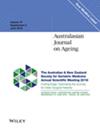‘This is perfect, thank you’: Research poetry on gratitude for voluntary assisted dying in Victoria, Australia
Abstract
Objective
To undertake the first scholarly examination in Australia of how those involved in seeking voluntary assisted dying (VAD) discuss the concept of gratitude for this new end-of-life choice. The article shares findings through research poetry, an arts-based form of research where poems are developed from data (here, interview transcripts).
Methods
Twenty-eight semi-structured qualitative interviews were conducted with 33 participants (32 family caregivers; one patient). Participants were asked about their VAD experience, with caregivers also asked about the experience of their family member. Data were thematically analysed, focusing on expressions of gratitude for VAD. Miller's five-step process was adopted to create the research poetry.
Results
Gratitude for VAD was a significant concept for participants. We identified three gratitude themes relating to what people were grateful for, who people were grateful to and other feelings mixed in with their gratitude, such as ambivalence. We created six poems to illuminate these findings and give voice to the gratitude expressed by patients and family caregivers about VAD.
Conclusions
Gratitude for VAD was emphasised by participants as an important part of their experience and something that can help family caregivers cope after a VAD death. Expressions of gratitude can support health professionals providing VAD and create support for law reform in other jurisdictions. Research poetry reflecting this gratitude can contribute to reducing the stigma attached to VAD and enhance awareness of this relatively new end-of-life choice. More research is needed into the emotional experience of those involved in seeking and receiving VAD in Australia.

 求助内容:
求助内容: 应助结果提醒方式:
应助结果提醒方式:


